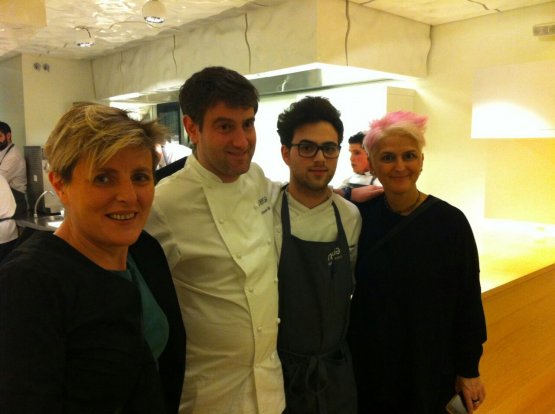“The Parabere forum intends to create a powerful global network to strengthen the influence of women in the food sector”. I had read about this forum organised by Maria Canabal and thought I couldn’t miss it. So when Elisia Menduni called me and told me I was invited, I accepted without thinking twice.
“Amazing”. “Uncroyable”. “Splendida”… These are only few of the adjectives that can be associated with Maria Canabal and I could mention them in as many as 26 languages. 26 indeed, because this was the number of nationalities of the participants in this first event organised in Bilbao, Spain. Before speaking about the speeches, I would like to describe the atmosphere: magical. Women often do not connect right away with each other and they don’t do it in terms of cameraderie. Here, instead, everything was smooth, lively yet deep, (almost) never taken for granted. I spoke with many, many women, all of whom participated in a circuit that was hungry for knowledge and success.

At the end, a dinner at Nerua in Bilbao: in the photo, Viviana Varese, patron Josean Alija, his Italian sous chef Giacomo Sbalzer and the author of this article, Cristina Bowerman
I felt people express the same anger I felt when it was pointed out that it will take us at least 80 years to reach equality of the sexes, as explained by
Thais Compoin, a very prominent diversity and inclusion leader. I spent lots of time listening to
Antonia Klugmann and the story of her border-cuisine. I discussed the issues connected with women accessing the profession and the difficulties women-chefs have in finding sponsors for projects in which they believe. It was interesting to listen to different points of view, discussing with
Sole 24 Ore’s journalist
Fernanda Roggero,
Angela Barusi of
Forma Libera and
Viviana Varese, chef at
Alice, during a nice dinner at
Nerua (thank you
Josean for the splendid welcome!).
I once again met chefs I admire greatly, such as Elisabeth Falkner and Anita Lo (where I did an internship years ago) and also Graziella Battista of Graziella in Montreal (with whom I had the pleasure to cook at a festival). And many Italians: Maria Cicorella, Marzia Buzzanca, Sandra Salerno and many more whom I forgot. It was a pleasure to see that Lara Gilmore found some time to tell us about the birth of a network for women and inspire all of us to enjoy the art surrounding us. Listening to her describing a walk among the works of Richard Serra at Guggenheim was beautiful.
In the end, however, what one wonders is if a forum like this has any use: in my very personal opinion, it is useful. Because as it grows it will act as a stimuli for women, supporting them in their personal evolution. And already in this first edition I had the chance to discover stimulating experiences and new projects, such as the one that has
Isabel Soares, founder of
Fruta Feia in Portugal, as its protagonist. This very interesting project not only recycles “ugly” fruit and vegetables but most of all it teaches that what vegetables and fruits look like is not essential at all: what counts is quality and taste.
Jessamyn Rodriguez, instead, founded
Hot Bread Kitchen, thanks to which emarginated women can start a journey that takes them to recuperate themselves and their awareness, so much so they become bakers who are so efficient they are among the suppliers of very many firms, including
Whole Foods.
“Everything is possible” is a statement I love and being able to listen to these stories and discuss them with their protagonists gives a solidity to what would otherwise remain just a motto. Yet everything is possible, indeed! One advice to large companies: support us, because we are the second wind in the wine and food world.